This is part 13 of the Early Church History class.
Between the year 325 and 381 titanic shifts occurred that changed Christianity forever. Rather than ending conflict and ushering in a golden era of lasting peace, Constantine’s Council of Nicea ignited a theological civil war within Christianity that raged for six more decades. In today’s episode you’ll learn about the struggle over Christology that eventually ended with the emperor Theodosius endorsing the trinitarian creed of Constantinople in 381. Rather than sugarcoating this tumultuous period, my hope is to relentlessly tell the truth in hopes that you can draw your own conclusions.
Listen to this episode on Spotify or Apple Podcasts
—— Links ——
- See other episodes and posts about the Trinity here
- More Restitutio resources on Christian history
- See other classes here
- Support Restitutio by donating here
- Join our Restitutio Facebook Group and follow Sean Finnegan on Twitter @RestitutioSF
- Leave a voice message via SpeakPipe with questions or comments and we may play them out on the air
- Intro music: Good Vibes by MBB Attribution-ShareAlike 3.0 Unported (CC BY-SA 3.0) Free Download / Stream: Music promoted by Audio Library.
- Who is Sean Finnegan? Read his bio here
—— Notes ——
325 Council of Nicaea
- Constantine invited many bishops to his lake summer palace at Nicaea.
- Between 250 and 300 bishops attended, but only 5 from the West.
- Constantine suggested adding the word homoousios to the creed that Eusebius of Caesarea presented.
- The Creed of Nicaea declares the Son to be “begotten of the Father…that is, from the essence (ousia) of the Father…begotten not made, one in essence (homoousia) with the Father”.
Decades of Controversy
- The Council of Nicaea did not pacify the controversy but instead fueled it.
- Everyday people were informed and argued about the various positions in the streets, baths, and marketplaces.
Three Main Parties
- Homoousions (Athanasius)
- Anomoeans (Eunomius)
- Homoians (Acacius)
Athanasius of Alexandria (296-373)
- 326 – Became bishop of Alexandria
- Took up mantle of Alexander and fought tirelessly for the eternal Son position and homoousios
- Repeatedly deposed and exiled from Alexandria
- Spent at least 15 years in exile of his 45 year bishopric
- Used violent speech and physical violence to defeat his enemies
Anomoeans
- Believed the Son was not like the Father
- Most famous representative was Eunomius.
- Strong subordinationists
- 357 – Second Creed of Sirmium
Homoians
- Believed the Son was like the Father but not the same substance
- Constantinople was a homoian stronghold for decades prior to 381.
- 360 – Council of Constantinople produced a homoian
Three Cappadocians
- Basil of Caesarea (330-379), Gregory of Nyssa (335-395), Gregory of Nazianzus (329-390)
- Added in the Holy Spirit as worthy of worship and honor with the Father and Son
- Used terminology of three persons (hypostases) in one substance (ousia)
381 Council of Constantinople
- Attended by only 150, none from the West (thus not ecumenical)
- Not considered a definitive council in its time
- Produced the language recited in churches even to this day
- The Constantinopolitan Creed is often wrongly called the Nicene Creed today.
The State Church
- Emperor Theodosius decreed that all “Catholic Christians” had to accept the Trinity as defined at Constantinople in 381.
- 384 – Removed Altar of Victor from Senate in Rome
- Outlawed pagan sacrifices
- Widespread destruction of temples
- 388 – Marriage of Christians and Jews prohibited
- 399 – Country temples were destroyed.
- 408 – Only Catholic Christians can serve in the palace.
- 415 – Pagans barred from military and civil service
- The Constantinian shift was now complete.
Review
- At the Council of Nicaea in 325, emperor Constantine introduced the theologically problematic word “homoousios” into the controversy over the Son’s origin and substance.
- The original Nicene Creed did not mention three persons in one God, nor did it define the Holy Spirit.
- The theological civil war that Nicaea caused raged on for another 56 years (at least), as council after council favored different positions.
- The three main parties in the battle were homoousions (Nicenes), anomoeans (Arians), and homoians (Semi-Arians).
- Athanasius of Alexandria led the charge for the homoousions, attacking his theological enemies with viscous words, malicious politicking, and physical violence.
- Successive emperors supported different theological factions throughout the fourth century, swinging imperial favor back and forth.
- Basil of Caesarea, Gregory of Nyssa, and Gregory of Nazianzus (the three Cappadocians) developed the full-blown Trinity theory, including the Holy Spirit as worthy of equal worship and honor.
- Although it was not ecumenical nor well-attended, the 381 Council of Constantinople defined the doctrine of the Trinity many are familiar with today.
- Emperor Theodosius enforced the Constantinopolitan Creed for all “Catholic Christians” in his domain, limiting religious freedom for non-Trinitarians, pagans, and Jews.
- Theodosius completed the Constantinian shift by officially merging one brand of Christianity with the state.

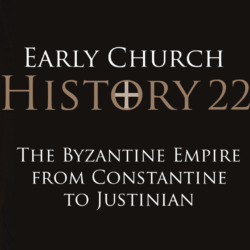
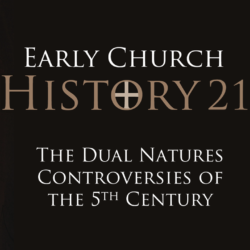
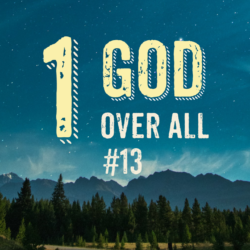
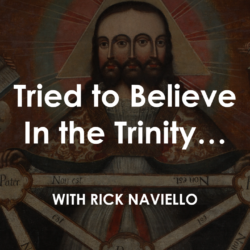
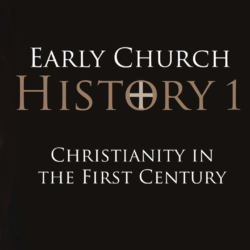
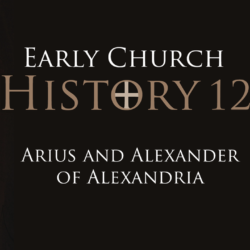
Hi Sean, thanks for this episode, such an impressive amount of material you managed to cover.
I have got a question for you, though. I fully agree with your statement that what we want to do is restore the Christianity of Jesus’ day. Now, you briefly mentioned the controversy regarding the date of “Easter” or rather Pesach but let’s leave the semantics aside for now. I have got a Jewish colleague who actually brought up how “Easter” is derived from Judaism, which is of course true, and she brought up how it was celebrated on a different day. I should mention she didn’t mean this in a way to delegitimize it or anything, just as an observation. Anyway, as an aside I told her that, btw, “we” got this thing wrong and the common Christian date is incorrect.
I say this because it was based first on a pagan calendar (Julian), later on a newly invented one named after a pope (Gregorian) from the late middle ages. Now, it’s certainly an impressive work of calculation, but, being an invention, it nevertheless isn’t biblical.
Thus my view is we should stick with the Hebrew calendar, or, if you have some issue even with that (an argument can be made it’s no longer function exactly as it once was, but I will not get into details here), perhaps some variation of it, but certainly not the Julian or Gregorian variants.
So my question is how do you deal with this issue, especially since you’re involved in ministry and will likely also be involved in deciding how your church decides on the day, making this a decision that impacts the whole church? And if you’re just sticking with the Gregorian date, is this something that is at least considered?
My aim is not to be that one weird guy who has to come make a big issue out of everything, but I do think that it’s something that is important and should be considered.
Kind regards and many thanks, Mark
Hi Sean, thanks for addressing my question in your follow up episode. Just wanted to give a quick clarification.
I tried to keep my comment concise, so I did not include much detail, but I actually agree that non-Jewish Christians have no obligation to celebrate holidays such as Pesach (or other commandments given only to Israel). However, since we generally do, what I was trying to convey is my view that it is not up for us to *alter* it by coming up with new calculations based on unbiblical calendars. I agree it’s fine to use different calendars for non-religious purposes, that was not my point at all. But to use them to alter the God-given dates of God-given holidays, that is what I think we should be very careful with–something which I rarely find to be the case. I also disagree with the claim that the date is somehow based on the date of pesach to this day. Again, using invented calendars prevents this from being the case. This is also why we find the EO celebrating on a different day than the churches using the Gregorian calendar. But in either case, Easter overlapping with Pesach is a mere coincidence that happens only occasionally.
I agree with you that restoring the dates may prove inconvenient for people, but we will probably differ on how relevant inconvenience is to the matter. Judaism experiences the exact same issues (plus many more, e.g., the sabbath) and sees no need to adjust the dates for this reason, and I’m inclined to agree with this approach here.
Anyway, thanks again, I have learned an immense amount from all your work and wish you all the best,
Mark
(btw, I don’t expect another response, just wanted to give some extra clarifications regarding where I’m coming from)